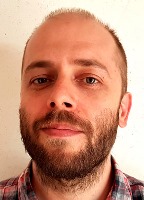People of ACM European Chapters - Marcos Serrano
September 11, 2018
Can you briefly describe your own line of research and how you became interested in this area?
My research activities focus on proposing novel interaction techniques to solve some of the challenges of ubiquitous interfaces, mainly mobile and multi-display interfaces.
Not only has the number of mobile devices dramatically increased, but their computing capabilities (and hence the number of available applications and data to manipulate) have increased as well. This raises numerous challenges of how to easily and rapidly interact with such a growing quantity of data on mobile platforms. Multi-display environments (MDEs) are common in desktop environments and are becoming more and more frequent in professional and public environments. However, they also bring new challenges due to the complexity of the overall system, which can be composed of multiple and heterogeneous devices, arranged in dynamic spatial topologies. Hence there is a pressing need for novel fluid interactions in MDEs.
I became interested in human-computer interaction (HCI) while studying computer science, as I realized that the human was scarcely considered when designing computer systems. One of the thrilling aspects of our research is its interdisciplinarity. I had opportunities to collaborate with many talented researchers from various fields, from cognitive psychology to design, and I think this variety of perspectives is what makes our research field so particular, stimulating, and, at the same time, challenging. This interdisciplinarity is at the heart of the ELIPSE research group at the University of Toulouse.
In your area of research, what recent advance/emerging subfield will yield important advances in the years ahead?
Freeform interfaces yield important promises and challenges. To fulfill the adoption of pervasive displays, we need to facilitate a seamless integration of displays into existing environments, ranging from in-vehicle and wearable displays to public displays. Traditional rectangular displays are not well suited for these applications, as they cannot be easily integrated. Emerging technologies allow for the creation of nonrectangular displays with unlimited constraints in shapes. With this imminent adoption comes the urgent challenge of rethinking the way we present content on nonrectangular displays.
Will you tell us a little about the Toulouse ACM SIGCHI Chapter?
Founded in 1995, the goal of SIGCHI Toulouse is to provide a means for all HCI researchers and practitioners in the Toulouse region to come together, discuss topics in our field and promote collaboration. The chapter has around 150 members from both academia and industry. We regularly host international researchers for our SIGCHI seminars, for example, Pourang Irani (University of Manitoba, Canada), Sriram Subramanian (University of Sussex, UK) or Andy Cockburn (University of Canterbury, New Zealand). The chapter was also involved in the organization of the Francophone Conference on Human-Computer Interaction (IHM 2015), which was held in Toulouse.
What advice would you offer a younger colleague just starting out in the field?
Conducting HCI research is challenging, as young researchers need to tackle the various problems of designing, prototyping and evaluating interaction. It is crucial to learn existing methods, but also to question them and propose new ones. I would therefore encourage our youngest peers to embrace this learning process, enjoy it, and seek advice from fellow peers. In my experience, most people in our community are happy to help.

Marcos Serrano is an Assistant Professor at the University of Toulouse (France) and a researcher at the ELIPSE team at the Informatics Research Institute of Toulouse (IRIT). His research is dedicated to designing novel interaction techniques in the field of mobile and ubiquitous computing. Recently Serrano published research findings on interactions with unconventional displays, multi-display environments, and mobile devices.
He has been an active volunteer with the CHI community, having served as Paper Chair at Mobile HCI 2016, as well as a Program Committee member for conferences including CHI 2017 and 2018, and Mobile HCI 2014 and 2015. Serrano is Chair of the Toulouse, France ACM SIGCHI Chapter (SIGCHI Toulouse).